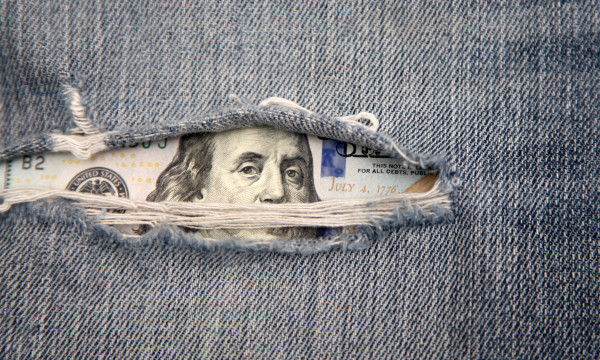Revitalize your finances: A spring cleaning guide from UBT

As the seasons change, it’s not just our dwellings that could use a good cleaning — our finances could benefit from a refresh, too. Your friends at UBT have put together some easy, actionable tips to help you spruce up your financial landscape and maybe save some green in the process.
Sort out your financial goals
Review and reassess your financial goals. Whether it’s paying off loans, saving for a home, investing for the future, or planning a dream vacation, having clear objectives can keep you motivated and focused on your financial journey. Don’t be afraid to adjust your goals if you need to, though, especially if you have to account for unforeseen circumstances or inflation. If that’s the case, setting up or updating your budget could be very beneficial.
Check your credit report
A clean credit report is crucial for maintaining good financial health. Fortunately, federal law allows you to get a free copy of your credit report every 12 months from each agency, and you can request your free credit reports at www.annualcreditreport.com. You'll want to look them over carefully and address any errors or discrepancies promptly.
Dust off debt
With high-interest debt, the amount you owe compounds quickly. Whether it’s realigning your budget, a consolidation loan, a balance transfer (with a reasonable timeline), or using your tax refund toward your balance, accelerated payoff of high-interest debt can provide great financial freedom, not to mention relief.
Sweep up unused subscriptions
Review your subscriptions and recurring expenses, canceling any services or memberships that you no longer use or find essential. This simple step can free up funds for more meaningful purposes, and we have just the tool to help! Download UBT’s free subscription audit guide to get started.
Polish up your payments
Also known as a regular payment review, this is as simple as working with your provider to reduce your regular payments by asking for a discount or better package on things like cell phone service, internet, and/or streaming services. If your negotiations don’t pan out (it happens, but you don’t know if you don’t ask), consider competitors with less expensive options.
While you’re at it, move your recurring payments to your debit card for easy-to-track payments. Better yet, with UBT’s Simply Free Plus checking account, you can earn higher interest when you meet a few easy requirements* — one of which is having at least 12 debit card transactions each month. So when you put bill payments on autopilot with your debit card, you’re also on your way to earning more interest, and that really adds up over time.
Inspect your insurance coverage
Examine your insurance policies, including health, renter’s, home, and auto. You’ll want to ensure that you’re not overpaying for unnecessary features and that you have enough coverage. This means that — and this is the fun part — an inventory and update of your belongings is in order for your homeowner’s or renter’s insurance. Next, shop around for better rates, if needed, or try your hand at asking for discounts or bundled packages.
Tame the paper
If you’re still getting paper statements from your bank or credit card company, why not go paperless? Paperless statements can also be provided for some loans, brokerage and retirement accounts, utility bills, and more, allowing you an easy way to track your finances because your statements are all in one place. Plus, going paperless reduces the amount of physical clutter in your home and is safer and much kinder to the environment.
If you have named a fiduciary such as UBT as the executor of your estate, ask them to keep a copy of your estate plan on file for you to reduce the risk of misplacing it. If you really want to get savvy with the rest of your paper documents (probably not your estate plan or taxes), you can look into uploading or digitizing your existing documents. Shred all old or redundant information — shredding events such as UBT’s Shred Day would make quick work of that task.
Ditch the digital clutter
Digital disorder can make us vulnerable to identity and financial theft, not to mention getting in the way of our focus. Attack the physical clutter first by determining what devices you own — don’t forget routers, gaming systems, smart home devices, and wearables. Discard old electronics safely by recycling old computers and smart devices through a reputable program like Best Buy and destroying hard drives. Then, on each device, check to see where you’re logged in on browsers, clearing your history and caches. Update all your passwords (use a password manager to keep track of them), unfollow/unfriend social media profiles that are inactive or no longer of interest, unsubscribe to emails that are unimportant, and opt out from certain senders altogether to avoid unsolicited information.
Once you’ve completed your initial tidying, take it a step further by deleting unused apps, removing old or unneeded files and emails, and emptying your downloads folder. Face what’s left with a practical eye, organizing your digital files into a clear system that works for you, neatening up your digital desktop, and backing up files with a secure cloud service, on another computer, or on an external hard drive. Lastly, take a look in any peer-to-peer apps to make sure you don’t have funds “loitering” that need to be transferred into your checking account, and voila — it’s a wrap!
Wrapping up
While these steps are easy, they can be time-consuming, so don’t try and tackle them all at once — develop a plan and address them on your own timeline. We think you’ll find that taking the time to spruce up your financial landscape will bring clarity, security, and organization to your financial life, saving you some money in the process. Treat yourself a little, you deserve it!
Learning Center articles, guides, blogs, podcasts, and videos are for informational purposes only and are not an advertisement for a product or service. The accuracy and completeness is not guaranteed and does not constitute legal or tax advice. Please consult with your own tax, legal, and financial advisors.
*Statement cycle activity requirements: 12 debit card purchases posted (ATM transactions do not apply), receive paperless statements (requires enrollment via online or mobile banking and ongoing valid email address), access online or mobile banking at least once, and one direct deposit posted.




